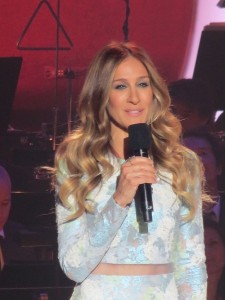Humanism & Feminism: Sarah Jessica Parker, You Can Have It All!
 Photo by Erlend Bjørtvedt via Wikimedia Commons
Photo by Erlend Bjørtvedt via Wikimedia Commons Actress Sarah Jessica Parker has been a longtime supporter of women’s equality, however last week she caused for a stir when she told Cosmopolitan magazine,
As [playwright] Wendy Wasserstein would say, I’m a humanist. I’m enormously appreciative of the work that my mother’s generation did. We are the beneficiaries of a lot of disappointment, heartache, discouragement, and misunderstanding. But I see a lot of people trying to sort out their roles. People of color, gays, lesbians, and transgenders who are carving out this space. I’m not spitting in the face or being lazy about what still needs to be done—but I don’t think it’s just women anymore. We would be so enormously powerful if it were a humanist movement.
There seems to be a lot of confusion here, both in terms of what Parker herself meant and in the way her words are being perceived. While she’s certainly not the first famous women to ditch the label of “feminist,” given the list of issues she says are important to her (Equality in pay, paid sick leave, access to health care and child care), she still cares about the women’s movement. But the Sex and the City star also seems to think that the feminist movement doesn’t stand for the wellbeing of all people. Sadly, there are a lot of folks who have this misunderstanding of feminism. Feminism isn’t simply a bunch of women sitting around yelling about men; it’s a movement to improve the quality of life for women in society, which in turn creates a better world for everyone.
In order to be a real feminist, you must be a humanitarian. You must care about the quality of life for every living being. This concept was made quite clear to us by suffragettes, many of whom were just as equally active as abolitionists during the nineteenth century, active in the civil rights movement of the 1960s, and active today for LGBTQ equality, among other social justice issues. It is quite simple—when you care so deeply for equality that it becomes part of your identity, it is likely that you share that same compassion for many people.
So, was Parker wrong to assume that she could not be an all-around human lover under the label of feminist? Yes, that is a common and unfortunate error. But what about that whole humanism thing?
The definition of humanism is often confused with humanitarianism. While both promote human welfare and equality, and even the protection of our earth, humanism includes another aspect that many outside of the secular community tend to overlook: humanists do not look to a higher power or authority to guide their morality. So, could it be that Parker truly is a secular humanist? Or, perhaps, has she fallen into the common trap of adding an “ism” to the end of any topic she may care about, while disregarding the actual definition of humanism?
I would guess the latter. Parker was raised Jewish and continues to identify as a cultural Jew, although she admits she doesn’t practice Judaism religiously. In fact, she didn’t even have a religious wedding and finds Unitarianism to be “attractive.” OK, I suppose she could be secular. She hasn’t said much to indicate her true beliefs or nonbelief anyway. However, the reasons she provided for her “humanism” don’t include secularism or nonbelief, and her reasons for un-identifying as a feminist don’t seem to coincide with humanism either.
When it comes down to it, Sarah Jessica Parker loves people—all people—and wants everyone to be happy and have the same opportunities and rights. Therefore, she calls herself a humanist.
Certainly one could say that the necessity of any label in order to show what you care about is absurd. Every person who expects civility and equality for themselves should support the same for others regardless of differences. It comes down to two avenues of thought: you either hate humanity or you don’t. The real problem Parker alludes to is the competing struggles for justice among minority groups—who deserves the most help when. In reality, we should all be helping each other out equally.
